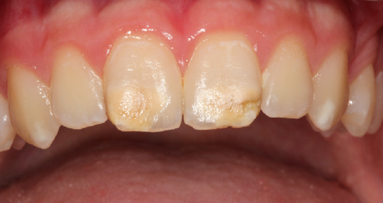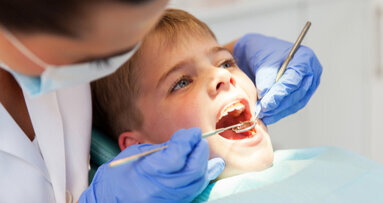GREIFSWALD, Germany: According to new research, nearly 80 per cent of 12-year-old sixth-graders in Germany have caries-free permanent dentition, making Germany top internationally, alongside Denmark, in terms of dental health in this age group. However, early childhood caries is still too common in the country and affects the healthy development of some children.
These latest figures come from the epidemiological accompanying investigations for group prophylaxis carried out on behalf of the Deutschen Arbeitsgemeinschaft für Jugendzahnpflege (DAJ), a German organisation dedicated to maintaining and promoting the oral health of children and adolescents. For the study, more than 300,000 children in the country underwent dental examinations in the 2015/2016 school year.
As part of the representative study, which the DAJ commissioned for the sixth time since 1994/1995, a dental team headed by the Greifswald paediatric dentist Prof. Christian Splieth determined the children’s oral health status in three age groups: 12-year-old pupils in the sixth grade, 6- to 7-year-old first-graders and, for the first time, 3-year-old kindergarten children. The examinations were conducted in ten federal states of Germany.
The unit of measure used to assess oral health was the dmf/DMF index. The study found a DMF score of 0.44 for the 12-year-olds studied, and 78.8 per cent of the children in this age group had a healthy dentition. Both values were the best ever achieved in Germany.
In the 6- to 7-year-old schoolchildren, however, who still mainly have primary teeth, the dmf score was 1.73. In this age group, only 53.8 per cent had a healthy dentition. This was only a slight improvement in the national average compared with the values recorded in the last DAJ study, conducted in 2010, for some federal states even had a slight deterioration. Thus, this age group was found to still have a higher caries burden than the group of 12-year-olds.
The epidemiological study found a dmf score of 0.48 for the 3-year-olds. This means that 13.7 per cent of this age group already had dental caries, while 86.3 per cent had healthy teeth. The data underpins what has already been suggested on the basis of previous regional studies and clinical experience: caries of the primary dentition occurs very early in some cases. A relatively small group of children had severe caries (3.57 dmf), which is very difficult to treat and often only under anaesthesia.
The findings show that there is social polarisation of caries already at a very early stage; however, they also suggest that the implementation of the DAJ recommendations published in 2016 for the prevention of early childhood caries for day care centres and parents was a step in the right direction and must be further expanded. The new findings will be evaluated in the coming months for further possibilities for prevention.
Tags:
BERLIN, Germany: Enamel fractures of freshly erupted molars that appear porous, hypersensitivity of the affected teeth and continued loss of fillings—this...
RAS AL-KHAIMAH, UAE: Although the association between dental anxiety and oral health-related quality of life is well established internationally, evidence ...
Kindness to oneself and self-love are concepts that are often spoken about in the context of looking after oneself and supporting personal well-being. ...
NEW YORK, U.S.: In a bid to help children in foster care improve their oral health, New York City’s Administration for Children’s Services (ACS) and the...
GOTHENBURG, Sweden: Despite the fact that the Swedish government has provided free dental care to children and young people for decades, research has shown ...
DURBAN, South Africa: As the number of reported cases of children with autism spectrum disorder (ASD) continues to climb across the globe, the special ...
LONDON, UK: New data released by the National Health Service (NHS) has painted a bleak picture of the state of oral health in children in the UK, with 322 ...
AACHEN, Germany: Dental care is vital for well-being and overall health but is sometimes neglected because of certain barriers to accessing dental services....
LONDON, UK: According to a recent survey carried out by the British Dental Association (BDA), an increasing number of dental patients in the UK are seeking ...
JÖNKÖPING, Sweden: When young people are placed in care, child welfare services, healthcare authorities and institutional care providers assume ...
Live webinar
Tue. 24 February 2026
1:00 pm EST (New York)
Prof. Dr. Markus B. Hürzeler
Live webinar
Tue. 24 February 2026
3:00 pm EST (New York)
Prof. Dr. Marcel A. Wainwright DDS, PhD
Live webinar
Wed. 25 February 2026
11:00 am EST (New York)
Prof. Dr. Daniel Edelhoff
Live webinar
Wed. 25 February 2026
1:00 pm EST (New York)
Live webinar
Wed. 25 February 2026
8:00 pm EST (New York)
Live webinar
Tue. 3 March 2026
11:00 am EST (New York)
Dr. Omar Lugo Cirujano Maxilofacial
Live webinar
Tue. 3 March 2026
8:00 pm EST (New York)
Dr. Vasiliki Maseli DDS, MS, EdM



 Austria / Österreich
Austria / Österreich
 Bosnia and Herzegovina / Босна и Херцеговина
Bosnia and Herzegovina / Босна и Херцеговина
 Bulgaria / България
Bulgaria / България
 Croatia / Hrvatska
Croatia / Hrvatska
 Czech Republic & Slovakia / Česká republika & Slovensko
Czech Republic & Slovakia / Česká republika & Slovensko
 France / France
France / France
 Germany / Deutschland
Germany / Deutschland
 Greece / ΕΛΛΑΔΑ
Greece / ΕΛΛΑΔΑ
 Hungary / Hungary
Hungary / Hungary
 Italy / Italia
Italy / Italia
 Netherlands / Nederland
Netherlands / Nederland
 Nordic / Nordic
Nordic / Nordic
 Poland / Polska
Poland / Polska
 Portugal / Portugal
Portugal / Portugal
 Romania & Moldova / România & Moldova
Romania & Moldova / România & Moldova
 Slovenia / Slovenija
Slovenia / Slovenija
 Serbia & Montenegro / Србија и Црна Гора
Serbia & Montenegro / Србија и Црна Гора
 Spain / España
Spain / España
 Switzerland / Schweiz
Switzerland / Schweiz
 Turkey / Türkiye
Turkey / Türkiye
 UK & Ireland / UK & Ireland
UK & Ireland / UK & Ireland
 Brazil / Brasil
Brazil / Brasil
 Canada / Canada
Canada / Canada
 Latin America / Latinoamérica
Latin America / Latinoamérica
 USA / USA
USA / USA
 China / 中国
China / 中国
 India / भारत गणराज्य
India / भारत गणराज्य
 Pakistan / Pākistān
Pakistan / Pākistān
 Vietnam / Việt Nam
Vietnam / Việt Nam
 ASEAN / ASEAN
ASEAN / ASEAN
 Israel / מְדִינַת יִשְׂרָאֵל
Israel / מְדִינַת יִשְׂרָאֵל
 Algeria, Morocco & Tunisia / الجزائر والمغرب وتونس
Algeria, Morocco & Tunisia / الجزائر والمغرب وتونس
 Middle East / Middle East
Middle East / Middle East












































To post a reply please login or register